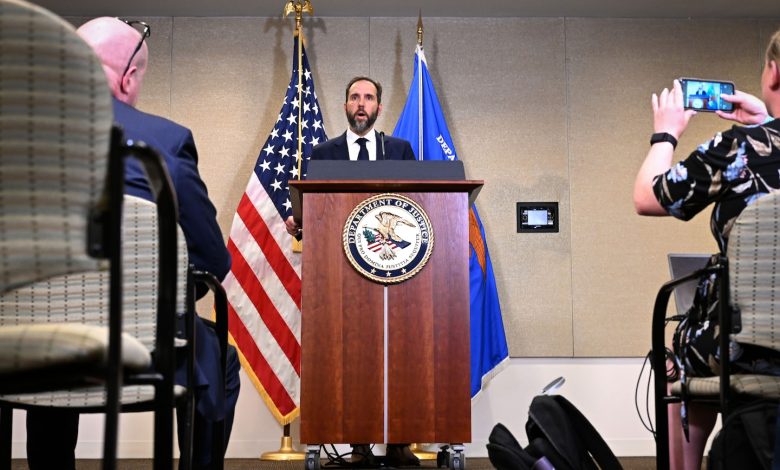Jack Smith’s most essential argument against Donald Trump’s immunity claim

“Extraordinary” is very much the right word at the moment, as special counsel Jack Smith pointed out in the argument he filed with the court Monday. Smith’s filing picks apart Trump’s argument neatly, but his emphasis on the extraordinariness of the situation is perhaps the most important for the public’s understanding of the case.
It’s worth noting that, as president, Trump never asserted that he had immunity from criminal prosecution in the way that his attorneys have post-presidency, despite having the opportunity to do so. In 2018, for example, Trump declared not that he was immune but that he had the right to grant himself a pardon should he face criminal charges for trying to obstruct special counsel Robert S. Mueller III’s investigation into Russian interference in the 2016 election. At the time, his legal argument centered on the idea that he couldn’t obstruct an investigation over which he had ultimate authority.
At one point in 2019, an attorney representing Trump argued that the president should be immune from prosecution even if he were to — as Trump once mused on the campaign trail — shoot someone dead on Fifth Avenue. But that was rooted in a 2000 opinion from the Justice Department’s Office of Legal Counsel that applied to sitting presidents, not former ones. (“This is not a permanent immunity,” his attorney said at the time.) Then Trump became a former president facing criminal prosecution, and here we are.
In his argument for the Supreme Court’s upcoming consideration of this emergent claim, Smith duly outlines various robust arguments against the idea that presidents enjoy asserted immunity. He notes, for example, that Trump’s position would “free the President from virtually all criminal law — even crimes such as bribery, murder, treason, and sedition,” an untenable situation. But it is when considering the past scenarios in which presidents might have faced sanction had they not enjoyed an unstated immunity that Smith’s most important argument is offered.
Trump “contends that the lack of any prosecutions of former Presidents until this case reflects the settled conclusion that criminal immunity precludes such a prosecution,” Smith’s filing reads. “But this prosecution is a historical first not because of any assumption about immunity but instead because of the singular gravity of the alleged conduct.”
He notes that the focus is on Trump’s efforts to retain power despite his loss in the 2020 election, what a lower court described as an attempt to “neutralize the most fundamental check on executive power — the recognition and implementation of election results.”
“The severity, range, and democracy-damaging nature of the alleged crimes,” Smith continues, “are unique in American history.”
This is perhaps not the most important legal argument. It is unquestionably the most important political one.
From the outset, Trump has claimed that he faces criminal charges not because of his actions but because of his politics. He was aided, politically and rhetorically, when the first indictment handed down was in a case that’s viewed by Americans as the most dubious. Republicans overwhelmingly and even most Americans generally think that the probes are at least in part focused on blocking Trump’s path back to the White House.
Trump has benefited from a robust and unrelenting effort within conservative media to downplay his actions or draw false equivalence with President Biden’s actions. Many of his supporters and, again, Americans overall, see politics at play in the investigations. Trump benefits enormously from cynical, superficial assessments that such behavior is normal or within the boundaries of how politicians might or should respond to an election loss. Smith uses Trump’s efforts to compare himself with past presidents to differentiate Trump’s behavior.
“The absence of any prosecutions of former Presidents until this case does not reflect the understanding that Presidents are immune from criminal liability,” the filing reads at another point. “[I]t instead underscores the unprecedented nature of [Trump’s] alleged conduct.”
From the outset, Trump has benefited from the idea that he is just like any other politician, although maybe he says meaner, coarser things than past presidents did publicly. The response to his presidency and his behavior from political actors and outside observers is waved away as overreactive or biased, a view that Trump works hard to bolster. It’s not that Trump is unusually worrisome for democracy; it’s that he is a more significant threat to the status quo so the powers that be work harder to tear him down.
Smith’s filing reinforces that this is not the case. Trump is an exception, and his actions after the 2020 election were exceptional. He is not a president facing attack for being an outsider but, instead, an outlier among chief executives who worked to undermine the democratic transfer of power.
The rest of Smith’s filing makes effective points against Trump’s legal argument concerning immunity. But his points about the exceptionality of Trump’s behavior are the most important for Americans broadly to understand.
To repeat: “The severity, range, and democracy-damaging nature of the alleged crimes are unique in American history,” Smith’s filing stated. Trump was indicted by a grand jury not because of politics as usual but because the exact opposite unfolded from November 2020 to January 2021.
Apsny News English
